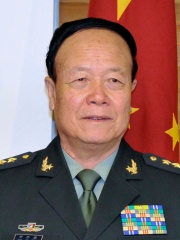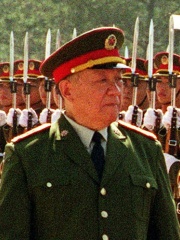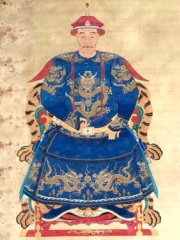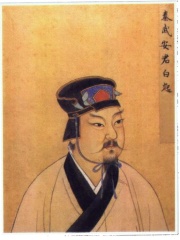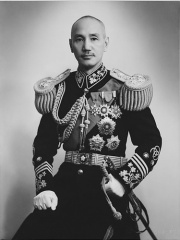
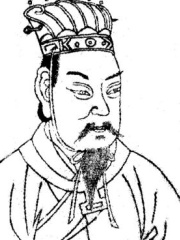
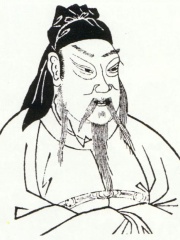
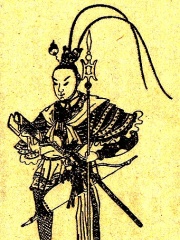
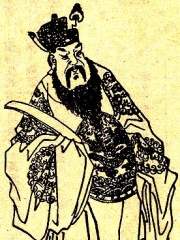
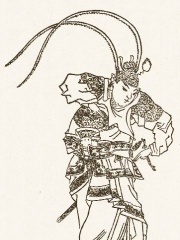
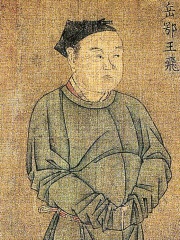
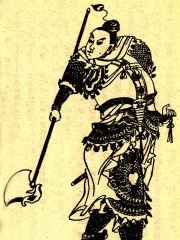
The Most Famous
MILITARY PERSONNELS from China
This page contains a list of the greatest Chinese Military Personnels. The pantheon dataset contains 2,058 Military Personnels, 64 of which were born in China. This makes China the birth place of the 8th most number of Military Personnels behind Japan, and Poland.
Top 10
The following people are considered by Pantheon to be the top 10 most legendary Chinese Military Personnels of all time. This list of famous Chinese Military Personnels is sorted by HPI (Historical Popularity Index), a metric that aggregates information on a biography's online popularity. Visit the rankings page to view the entire list of Chinese Military Personnels.

1. Chiang Kai-shek (1887 - 1975)
With an HPI of 86.25, Chiang Kai-shek is the most famous Chinese Military Personnel. His biography has been translated into 123 different languages on wikipedia.
Chiang Kai-shek (Chinese: 蔣介石; 31 October 1887 – 5 April 1975) was a Chinese politician, revolutionary, and military commander who led the Republic of China (ROC) from 1928 until his death in 1975. His government was based in mainland China until it was defeated in the Chinese Civil War by Mao Zedong's Chinese Communist Party (CCP) in 1949, after which he continued to lead the ROC government on the island of Taiwan. Chiang served as leader of the Nationalist Kuomintang (KMT) party and the commander-in-chief of the National Revolutionary Army (NRA), which was reorganized into the Republic of China Armed Forces in 1947, from 1926 until his death. Born in Zhejiang, Chiang received a military education in China and Japan and joined Sun Yat-sen's Tongmenghui organization in 1908. After the 1911 Revolution, he was a founding member of the KMT and head of the Whampoa Military Academy from 1924. After Sun's death in 1925, Chiang became leader of the party and commander-in-chief of the NRA, and from 1926 to 1928 led the Northern Expedition, which nominally reunified China under a Nationalist government based in Nanjing. The KMT–CCP alliance broke down in 1927 following the KMT's Shanghai Massacre, starting the Chinese Civil War. Chiang sought to modernise and unify the ROC during the Nanjing decade, although hostilities with the CCP continued. After Japan's invasion of Manchuria in 1931, his government tried to avoid a war while pursuing economic and social reconstruction. In 1936, Chiang was kidnapped by his generals in the Xi'an Incident and forced to form an anti-Japanese Second United Front with the CCP, and between 1937 and 1945 led China in the Second Sino-Japanese War, mostly from the wartime capital of Chongqing. As the leader of a major Allied power, he attended the 1943 Cairo Conference to discuss the terms for Japan's surrender in 1945, including the return of Taiwan, where he suppressed the February 28 uprising in 1947. When World War II ended, the civil war with the CCP (led by Mao Zedong) resumed. In 1949, Chiang's government was defeated and retreated to Taiwan, where he imposed martial law and the White Terror, a campaign of mass political repression; they lasted until 1987 and 1992, respectively. Beginning in 1948, he was re-elected five times by the same Eternal Parliament with six-year terms as President of the ROC, the head of a de facto one-party state, for 25 years until his death. Chiang presided over land reform, economic growth, and crises in the Taiwan Strait in 1954–1955 and again in 1958. He was considered the legitimate leader of China by the United Nations until 1971, when the ROC's seat was transferred to the People's Republic of China. After Chiang's death in 1975, he was succeeded as leader of the KMT by his son Chiang Ching-kuo, who was elected president in following terms by the same parliament since 1978. Chiang is a controversial figure. Supporters credit him with unifying the nation and ending the century of humiliation, leading the resistance against Japan, fostering economic development and promoting Chinese culture in contrast to Mao's Cultural Revolution. He is also credited with safeguarding Forbidden City treasures during the wars with Japan and the CCP, eventually relocating some of the best to Taiwan, where he founded the National Palace Museum. Critics fault him for his early non-resistance to Japan's occupation of Manchuria, flooding of the Yellow River, cronyism and tolerating corruption of the four big families, and his white terror on both mainland China and Taiwan.

2. Cao Cao (155 - 220)
With an HPI of 80.54, Cao Cao is the 2nd most famous Chinese Military Personnel. His biography has been translated into 61 different languages.
Cao Cao (; [tsʰǎʊ tsʰáʊ]; Chinese: 曹操; c. 155 – 15 March 220), courtesy name Mengde, was a Chinese statesman, warlord, and poet who rose to power during the end of the Han dynasty (c. 184–220), ultimately taking effective control of the Han central government. He laid the foundation for the state of Cao Wei (220–265), established by his son and successor Cao Pi, who ended the Eastern Han dynasty and inaugurated the Three Kingdoms period (220–280). Beginning in his own lifetime, a corpus of legends developed around Cao Cao which built upon his talent, his cruelty, and his perceived eccentricities. Cao Cao began his career as an official under the Han government and held various appointments including that of a district security chief in the capital and the chancellor of a principality. He rose to prominence in the 190s during which he recruited his own followers, formed his own army, and set up a base in Yan Province (covering parts of present-day Henan and Shandong). In 196, he received Emperor Xian, the figurehead Han sovereign who was previously held hostage by other warlords such as Dong Zhuo, Li Jue, and Guo Si. After he established the new imperial capital in Xuchang, Emperor Xian and the central government came under his direct control, but he still paid nominal allegiance to the emperor. Throughout the 190s, Cao Cao actively waged wars in central China against rival warlords such as Lü Bu, Yuan Shu, and Zhang Xiu, eliminating all of them. Following his triumph over the warlord Yuan Shao at the Battle of Guandu in 200, Cao Cao launched a series of campaigns against Yuan Shao's sons and allies over the following seven years, defeated them, and unified much of northern China under his control. In 208, shortly after Emperor Xian appointed him as Imperial Chancellor, he embarked on an expedition to gain a foothold in southern China, but was defeated by the allied forces of the warlords Sun Quan, Liu Bei, and Liu Qi at the decisive Battle of Red Cliffs. His subsequent attempts over the following years to annex the lands south of the Yangtze River never proved successful. In 211, he defeated a coalition of northwestern warlords led by Ma Chao and Han Sui at the Battle of Tong Pass. Five years later, he seized Hanzhong from the warlord Zhang Lu, but lost it to Liu Bei by 219. In the meantime, he also received many honours from Emperor Xian. In 213, he was created Duke of Wei and granted a fief covering parts of present-day Hebei and Henan. In 216, he was elevated to the status of a vassal king under the title "King of Wei" and awarded numerous ceremonial privileges, of which some used to be reserved exclusively for emperors. Cao Cao died in Luoyang in March 220 and was succeeded by his son Cao Pi who accepted the abdication of Emperor Xian in November 220 and established the state of Cao Wei to replace the Eastern Han dynasty— an event commonly seen as an usurpation. This marked the transition from the Eastern Han dynasty to the Six Dynasties period. After taking the throne, Cao Pi granted his father the posthumous title "Emperor Wu" ("Martial Emperor") and the temple name "Taizu" ("Grand Ancestor"). Apart from being lauded as a brilliant political and military leader, Cao Cao is celebrated for his poems. Opinions of him have remained divided from as early as the Jin dynasty (266–420) that came immediately after the Three Kingdoms period. There were some who praised him for his achievements in poetry and his career, but there were also others who condemned him for his cruelty, cunning, and allegedly traitorous ways. In traditional Chinese culture, Cao Cao is stereotypically portrayed as a sly, power-hungry, and treacherous tyrant who serves as a nemesis to Liu Bei, often depicted in contraposition as a hero trying to revive the declining Han dynasty.

3. Guan Yu (162 - 220)
With an HPI of 78.46, Guan Yu is the 3rd most famous Chinese Military Personnel. His biography has been translated into 44 different languages.
Guan Yu ([kwán ỳ] ; d. January or February 220), courtesy name Yunchang, was a Chinese military general serving under the warlord Liu Bei during the late Eastern Han dynasty of China. Along with Zhang Fei, he shared a brotherly relationship with Liu Bei and accompanied him on most of his early exploits. Guan Yu played a significant role in the events leading up to the end of the Han dynasty and the establishment of Liu Bei's state of Shu Han during the Three Kingdoms period. While he is remembered for his loyalty towards Liu Bei, he is also known for repaying Cao Cao's kindness by slaying Yan Liang, a general under Cao Cao's rival Yuan Shao, at the Battle of Boma. After Liu Bei gained control of Yi Province in 214, Guan Yu remained in Jing Province to govern and defend the area for about seven years. In 219, while he was away fighting Cao Cao's forces at the Battle of Fancheng, Liu Bei's ally Sun Quan broke the Sun–Liu alliance and sent his general Lü Meng to conquer Liu Bei's territories in Jing Province. By the time Guan Yu learned about the loss of Jing Province after his defeat at Fancheng, it was too late. He was subsequently captured in an ambush by Sun Quan's forces and executed at Linju, Xiangyang Commandery (臨沮, present-day Nanzhang County, Xiangyang City, Hubei). Guan Yu's life was lionised and his achievements were glorified to such an extent after his death that he was deified during the Sui dynasty. Through generations of storytelling—culminating in the 14th-century historical novel Romance of the Three Kingdoms—his deeds and moral qualities were greatly emphasized, making Guan Yu one of East Asia's most celebrated paragons of loyalty and righteousness. He is remembered as a culture hero in Chinese culture and is still worshipped by many people of Chinese descent in China, Taiwan, and other countries today. In religious devotion, he is reverentially called the "Emperor Guan" (Guān Dì) or "Lord Guan" (Guān Gōng). He is a deity worshipped in Chinese folk religion, popular Confucianism, Taoism, and Chinese Buddhism, and small shrines to him are almost ubiquitous in traditional Chinese shops and restaurants.

4. Lü Bu (161 - 199)
With an HPI of 77.65, Lü Bu is the 4th most famous Chinese Military Personnel. His biography has been translated into 32 different languages.
Lü Bu (; died 7 February 199), courtesy name Fengxian, was a Chinese military general, politician, and warlord who lived during the late Eastern Han dynasty of Imperial China. Originally a subordinate of a minor warlord Ding Yuan, he betrayed and murdered Ding Yuan and defected to Dong Zhuo, the warlord who controlled the Han central government in the early 190s. In 192, he turned against Dong Zhuo and killed him after being instigated by Wang Yun and Shisun Rui (士孙瑞), but was later defeated and driven away by Dong Zhuo's followers. From 192 to early 195, Lü Bu wandered around central and northern China, consecutively seeking shelter under warlords such as Yuan Shu, Yuan Shao, and Zhang Yang. In 194, he managed to take control of Yan Province from the warlord Cao Cao with help from defectors from Cao's side, but Cao took back his territories within two years. In 195, Lü Bu turned against Liu Bei, who had offered him refuge in Xu Province, and seized control of the province from his host. Although he had agreed to an alliance with Yuan Shu earlier, he severed ties with him after Yuan declared himself emperor – treason against Emperor Xian of Han – and joined Cao and others in attacking the pretender. However, in 198, he sided with Yuan Shu again and came under attack by the combined forces of Cao and Liu, resulting in his defeat at the Battle of Xiapi in 199. He was captured and executed by strangulation on Cao's order. Although Lü Bu is described in historical and fictional sources as an exceptionally mighty warrior, he was also notorious for his unstable behaviour. He switched allegiances erratically and freely betrayed his allies. He was always suspicious of others and could not control his subordinates. All these factors ultimately led to his downfall. In the 14th-century historical novel Romance of the Three Kingdoms, the details of his life are dramatized and some fictitious elements – including his romance with the fictional maiden Diaochan – are added to portray him as a nearly unchallenged warrior who was also a ruthless and impulsive brute bereft of morals.
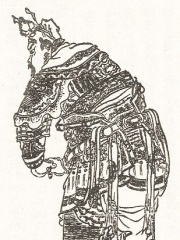
5. Zhang Fei (167 - 221)
With an HPI of 73.54, Zhang Fei is the 5th most famous Chinese Military Personnel. His biography has been translated into 32 different languages.
Zhang Fei () (traditional Chinese: 張飛; simplified Chinese: 张飞; pinyin: Zhāng Fēi; died July or August 221 AD), courtesy name Yide (益德), was a Chinese military general and politician serving under the warlord Liu Bei in the late Eastern Han dynasty and early Three Kingdoms period of China. Zhang Fei and Guan Yu, who were among the earliest to join Liu Bei, shared a brotherly relationship with their lord and accompanied him on most of his early exploits. Zhang Fei fought in various battles on Liu Bei's side, including the Red Cliffs campaign (208–209), takeover of Yi Province (212–214), and Hanzhong Campaign (217–218). He was assassinated by his subordinates in 221 after serving for only a few months in the state of Shu Han, which was founded by Liu Bei earlier that year. Zhang Fei is one of the major characters in the 14th-century historical novel Romance of the Three Kingdoms, which dramatises and romanticises the events before and during the Three Kingdoms period. In the novel, Zhang Fei became sworn brothers with Liu Bei and Guan Yu in the fictional Oath of the Peach Garden at the start of the novel and remained faithful to their oath until his death.

6. Dong Zhuo (139 - 192)
With an HPI of 73.32, Dong Zhuo is the 6th most famous Chinese Military Personnel. His biography has been translated into 29 different languages.
Dong Zhuo () (c. 140s – 22 May 192), courtesy name Zhongying, was a Chinese military general, politician, and warlord who lived in the late Eastern Han dynasty. At the end of the reign of the Eastern Han, Dong Zhuo was a general and powerful minister of the imperial government. Originally from Liang Province, Dong Zhuo seized control of the imperial capital Luoyang in 189 when it entered a state of turmoil following the death of Emperor Ling of Han and a massacre of the eunuch faction by the court officials. Dong Zhuo subsequently deposed Liu Bian (Emperor Shao) and replaced him with his half-brother, the puppet Emperor Xian to make him become the de facto ruler of China in the boy-emperor's name. The Eastern Han dynasty regime survived in name only. Dong Zhuo's rule was brief and characterized by cruelty and tyranny. In the following year, a coalition of regional officials (刺史; cishi) and warlords launched a campaign against him. Failing to stop the coalition forces, Dong Zhuo sacked Luoyang and relocated further west to the former Western Han capital at Chang'an (modern Xi'an, Shaanxi province). He was assassinated soon after in May 192 by his subordinate Lü Bu in a plot orchestrated by Interior Minister Wang Yun.

7. Zhou Yu (175 - 210)
With an HPI of 72.20, Zhou Yu is the 7th most famous Chinese Military Personnel. His biography has been translated into 26 different languages.
Zhou Yu (Chinese: 周瑜, ) (175–210), courtesy name Gongjin (Chinese: 公瑾), was a Chinese military general and strategist serving under the warlord Sun Ce in the late Eastern Han dynasty of China. After Sun Ce died in the year 200, he continued serving under Sun Quan, Sun Ce's younger brother and successor. Zhou Yu is primarily known for his leading role in defeating the numerically superior forces of the northern warlord Cao Cao at the Battle of Red Cliffs in late 208, and again at the Battle of Jiangling in 209. Zhou Yu's victories served as the bedrock of Sun Quan's regime, which in 222 became Eastern Wu, one of the Three Kingdoms. Zhou Yu did not live to see Sun Quan's enthronement, however, as he died at the age of 35 in 210 while preparing to invade Yi Province (modern Sichuan and Chongqing). According to the Records of the Three Kingdoms, Zhou Yu was described as tall and handsome. He was also referred to as "Zhou the Youth" (zhoulang 周郎). However, his popular moniker "Zhou the Beautiful Youth" (meizhoulang 美周郎) does not appear in either the Records or the 14th-century historical novel Romance of the Three Kingdoms. Some Japanese writers such as Fumihiko Koide believe that this was a later invention by Japanese storytellers such as Eiji Yoshikawa.

8. Yue Fei (1142 - 1142)
With an HPI of 71.84, Yue Fei is the 8th most famous Chinese Military Personnel. His biography has been translated into 27 different languages.
Yue Fei (Chinese: 岳飛; March 24, 1103 – January 28, 1142), courtesy name Pengju (鵬舉), was a Chinese military general of the Song dynasty and is remembered as a patriotic national hero, known for leading its forces in the wars in the 12th century between Southern Song and the Jurchen-led Jin dynasty in northern China. Because of his warlike stance, he was put to death by the Southern Song government in 1142 under a frameup, after a negotiated peace was achieved with the Jin dynasty. He was posthumously pardoned. Yue Fei is depicted in the Wu Shuang Pu by Jin Guliang. Yue Fei's ancestral home was in Xiaoti, Yonghe Village, Tangyin, Xiangzhou, Henan (in present-day Tangyin County, Anyang, Henan). He was granted the posthumous name Wumu (武穆) by Emperor Xiaozong in 1169, and later granted the noble title King of E (鄂王) posthumously by the Emperor Ningzong in 1211. Since his death and after the fall of the Song dynasty in 1279, Yue Fei is widely seen as a culture hero in China; he has evolved into a paragon of loyalty in Chinese culture.

9. Sun Ce (175 - 200)
With an HPI of 71.59, Sun Ce is the 9th most famous Chinese Military Personnel. His biography has been translated into 25 different languages.
Sun Ce (Chinese: 孫策; pinyin: Sūn Cè; Wade–Giles: Sun1 Ts‘ê4) () (175 – 5 May 200), courtesy name Bofu, was a Chinese military general, politician, and warlord who lived during the late Eastern Han dynasty of China. He was the eldest child of Sun Jian, who was killed during the Battle of Xiangyang when Sun Ce was only 16. Sun Ce then broke away from his father's overlord, Yuan Shu, and headed to the Jiangdong region in southern China to establish his own power base there. With the help of several people, such as Zhang Zhao and Zhou Yu, Sun Ce managed to lay down the foundation of the state of Eastern Wu during the Three Kingdoms period. In 200, when the warlord Cao Cao was at war with his rival Yuan Shao in the Battle of Guandu, Sun Ce was rumoured to be planning an attack on Xuchang, Cao Cao's base. However, he was assassinated before he could carry out the plan. Sun Ce was posthumously honoured as "Prince Huan of Changsha" (長沙桓王) by his younger brother Sun Quan when the latter became the founding emperor of Eastern Wu. Chen Shou's Records of the Three Kingdoms (Sanguozhi) describes Sun Ce as a handsome man who was full of laughter. He was also a generous and receptive man who employed people according to their abilities. As such, his subjects were willing to risk their lives for him. One detractor named Xu Gong, in a letter to Emperor Xian, compared Sun Ce to Xiang Yu, the warrior-king who overthrew the Qin dynasty. As a result, Sun Ce was also referred to as the "Little Conqueror" in popular culture. Sun Ce is depicted in the Wu Shuang Pu (無雙譜, Table of Peerless Heroes) by Jin Guliang.
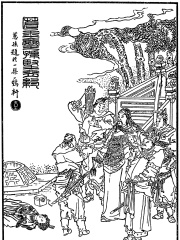
10. Sun Jian (155 - 191)
With an HPI of 71.36, Sun Jian is the 10th most famous Chinese Military Personnel. His biography has been translated into 26 different languages.
Sun Jian (Chinese: 孫堅; pinyin: Sūn Jiān) () (155–191?), courtesy name Wentai, was a Chinese military general, politician, and warlord who lived during the late Eastern Han dynasty of China. He allied himself with Yuan Shu in 190 when warlords from eastern China formed a coalition to oust Dong Zhuo, a tyrannical warlord who held the puppet Emperor Xian of Han in his power. Although he controlled neither many troops nor much land, Sun Jian's personal bravery and resourcefulness were feared by Dong Zhuo, who placed him among Yuan Shao, Yuan Shu and Liu Biao as the most influential men at that time. After the coalition disbanded in the next year, China fell into civil war. In 191, Sun Jian was killed in battle during an offensive campaign against Liu Biao. Sun Jian was the father of Sun Quan, one of the central figures of the Three Kingdoms era who eventually established the Eastern Wu dynasty in 222. Sun Jian was given the posthumous name Emperor Wulie (武烈皇帝) and the temple name Shizu (始祖).
People
Pantheon has 64 people classified as Chinese military personnels born between 401 BC and 1986. Of these 64, 3 (4.69%) of them are still alive today. The most famous living Chinese military personnels include Guo Boxiong, Chi Haotian, and Dong Jun. The most famous deceased Chinese military personnels include Chiang Kai-shek, Cao Cao, and Guan Yu. As of April 2024, 2 new Chinese military personnels have been added to Pantheon including Dong Jun, and Yu Xu.
Living Chinese Military Personnels
Go to all RankingsDeceased Chinese Military Personnels
Go to all RankingsChiang Kai-shek
1887 - 1975
HPI: 86.25
Cao Cao
155 - 220
HPI: 80.54
Guan Yu
162 - 220
HPI: 78.46
Lü Bu
161 - 199
HPI: 77.65
Zhang Fei
167 - 221
HPI: 73.54
Dong Zhuo
139 - 192
HPI: 73.32
Zhou Yu
175 - 210
HPI: 72.20
Yue Fei
1142 - 1142
HPI: 71.84
Sun Ce
175 - 200
HPI: 71.59
Sun Jian
155 - 191
HPI: 71.36
Wu Sangui
1612 - 1678
HPI: 71.24
Bai Qi
250 BC - 257 BC
HPI: 71.18
Newly Added Chinese Military Personnels (2025)
Go to all RankingsOverlapping Lives
Which Military Personnels were alive at the same time? This visualization shows the lifespans of the 10 most globally memorable Military Personnels since 1700.

